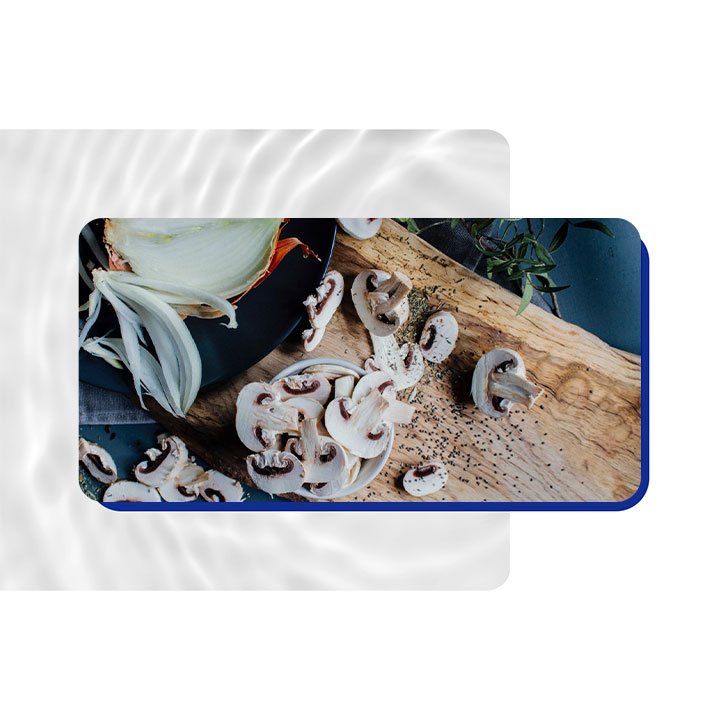Whether it’s coffee or tea, many people reach for that cup of caffeine first thing in the morning. It’s a ritual that jumpstarts the day and provides the energy needed to power through. Still, if you find yourself struggling to make it through the afternoon, you might want to consider mushrooms as your new best friend.
Caffeine too late in the day can disrupt sleep patterns, keeping you up late with insomnia, so the low energy cycle continues. Mushrooms, on the other hand, may be able to support the sustained energy you need to feel good all day long. Unlike the quick fix of caffeine, mushrooms can provide a more balanced and long-lasting form of energy by supporting the entire adrenal system.
Mushrooms have been used for centuries in traditional medicines all over the world. They are packed with nutrients that can help support your energy levels and overall health, so you don’t have to rely on caffeine to make it through your day.
Why are Mushrooms So Supportive of Your Health?
Before diving into all the ways mushrooms support even energy, it’s helpful to consider why mushrooms are so good for you.
The compounds found in these small plants impact many systems in the body, from your muscles to the cardiovascular, hormone, and immune systems, which can translate to balanced energy and health.1 In other words, mushrooms support energy by keeping your body balanced so you can function at your best.
Mushrooms contain compounds that support healthy energy, mental clarity, and other health benefits, such as:1
- Polysaccharides: long-chain sugar molecules that can help support immune health.
- Peptides: short chains of amino acids that can help with muscle function.
- Phenolic compounds: antioxidants that can help scavenge free radicals and support healthy cells.
For example, one way mushrooms could help support healthy energy levels is because of their antioxidant activity. By keeping free radicals in check that could otherwise add to oxidative stress in the cell, medicinal mushrooms can support healthy mitochondrial function to generate energy production. i Mitochondria are the organelles responsible for transforming nutrients from the food we eat into energy.
Here are a few specific ways research suggests mushrooms can support energy:
Mushrooms Act as Adaptogens to Support Stress Resilience
Adaptogens are a class of botanicals that help the body adapt to stress.2 When our bodies are under stress, it can impact everything from how we sleep to our ability to concentrate and focus.
Adaptogens may work partly by supporting the hypothalamic-pituitary-adrenal (HPA axis).2 Your HPA axis is the control centre for your body’s stress response, and adaptogens may help keep it functioning properly to protect against the negative impacts of stress on the body.
Stress and energy go hand-in-hand because when we’re stressed, our bodies are in “fight-or-flight” mode. Being constantly in this mode can lead to burnout and make you much more tempted to reach for a sugary or caffeine-filled beverage. Certain mushrooms could help maintain stress resilience to prevent feelings of burnout and overwhelm.
Some types of mushrooms may help when you are feeling completely drained, while others could help with increased energy and concentration during times of stress. Reishi, for example, is a type of mushroom used in traditional Chinese medicine for centuries. It is supportive of immune health and nourishing the adrenals.3 Mushroom adaptogens like reishi could help moderate mild fatigue and overall well-being.4
Mushrooms Could Support Mental Clarity
Brain fatigue can make you want to reach for an afternoon cup of coffee or energy drink. But these beverages may give you a quick boost followed by an inevitable crash. Some mushrooms could help improve focus and concentration without the crash.
Lion’s mane is a type of mushroom that has been shown to support cognitive function.5 It may help with the growth and repair of nerve cells by supporting the brain’s production of nerve growth factor (NGF) levels. NGF is a protein that helps to protect and repair nerve cells, and it has been shown to decline with age.6

Mushrooms Could Help Healthy Energy Production During Exercise
We all know how important it is to get regular exercise. But starting a new workout routine can be daunting if you’re not used to being active. And if you’re not properly fuelled, it can be tough to get through a workout without feeling fatigued.
Mushrooms could help support energy production during exercise. Cordyceps mushrooms, for example, have been shown to improve physical performance and help the body better use oxygen in studies on healthy, older adults.7,8
In one study, subjects were given cordyceps or a placebo every day for six weeks. At the end of the study, those who took the mushrooms saw significant improvements in their aerobic capacity compared to those who received the placebo, suggesting that cordyceps supported could help you feel less fatigued during a workout and improve your endurance.7
Mushrooms Support Healthy Energy Metabolism
Mitochondria are organelles in your cells that produce energy from the food you eat. One of the normal by-products of mitochondrial energy production is the generation of free radicals. These unstable molecules can damage cellular structures. This production also goes up after intense exercise.
Your body works hard to keep free radicals in check with antioxidants. Antioxidants help by scavenging the free radicals and neutralising them. One theory of why we feel fatigued is that free radicals (also called reactive oxygen species or ROS) build up and overwhelm the body’s natural repair system, affecting normal energy metabolism.9 Some research suggests that mushrooms have antioxidant activity that can help remove the excess free radicals and help mitochondrial energy production to reduce fatigue.10
Mushrooms are a Healthy Way to Support Even Energy
If you’re looking for an energy boost that doesn’t come from caffeine, mushrooms may be a good solution. Mushrooms that act as adaptogens may help your body better respond to stress, support better sleep, and improve mental clarity. And certain mushrooms could also help support energy production during exercise. Add mushrooms to your diet by including them in meals or taking them as a supplement. In combination with a healthy diet and lifestyle, mushrooms could help you maintain all-day energy.
+Caitlin Beale, MS, RDN is a registered dietitian and freelance health writer. She has a master’s degree in nutrition and over ten years of experience as a registered dietitian.
+The views expressed in this article are those of the authors. They do not reflect the opinions or views of Pure Encapsulations®.
1 Geng, Ping, Ka-Chai Siu, Zhaomei Wang, and Jian-Yong Wu. “Antifatigue Functions and Mechanisms of Edible and Medicinal Mushrooms.” BioMed Research International 2017 (2017): 9648496. https://doi.org/10.1155/2017/9648496.
2 Panossian, Alexander, and Georg Wikman. “Effects of Adaptogens on the Central Nervous System and the Molecular Mechanisms Associated with Their Stress—Protective Activity.” Pharmaceuticals 3, no. 1 (January 19, 2010): 188–224. https://doi.org/10.3390/ph3010188.
3 Wachtel-Galor, Sissi, John Yuen, John A. Buswell, and Iris F. F. Benzie. “Ganoderma Lucidum (Lingzhi or Reishi): A Medicinal Mushroom.” In Herbal Medicine: Biomolecular and Clinical Aspects, edited by Iris F. F. Benzie and Sissi Wachtel-Galor, 2nd ed. Boca Raton (FL): CRC Press/Taylor & Francis, 2011. http://www.ncbi.nlm.nih.gov/books/NBK92757/.
4 Tang, Wenbo, Yihuai Gao, Guoliang Chen, He Gao, Xihu Dai, Jinxian Ye, Eli Chan, Min Huang, and Shufeng Zhou. “A Randomized, Double-Blind and Placebo-Controlled Study of a Ganoderma Lucidum Polysaccharide Extract in Neurasthenia.” Journal of Medicinal Food 8, no. 1 (2005): 53–58. https://doi.org/10.1089/jmf.2005.8.53.
5 Mori, Koichiro, Satoshi Inatomi, Kenzi Ouchi, Yoshihito Azumi, and Takashi Tuchida. “Improving Effects of the Mushroom Yamabushitake (Hericium Erinaceus) on Mild Cognitive Impairment: A Double-Blind Placebo-Controlled Clinical Trial.” Phytotherapy Research: PTR 23, no. 3 (March 2009): 367–72. https://doi.org/10.1002/ptr.2634.
6 Ma, Bing-Ji, Jin-Wen Shen, Hai-You Yu, Yuan Ruan, Ting-Ting Wu, and Xu Zhao. “Hericenones and Erinacines: Stimulators of Nerve Growth Factor (NGF) Biosynthesis in Hericium Erinaceus.” Mycology 1, no. 2 (June 23, 2010): 92–98. https://doi.org/10.1080/21501201003735556.
7 Yi, Xiao, Huang Xi-zhen, and Zhu Jia-shi. “Randomized double-blind placebo-controlled clinical trial and assessment of fermentation product of Cordyceps sinensis (Cs-4) in enhancing aerobic capacity and respiratory function of the healthy elderly volunteers.” Chinese Journal of Integrative Medicine 10.3 (2004): 187-192. https://doi.org/10.1007/BF02836405
8 Chen, Steve, Zhaoping Li, Robert Krochmal, Marlon Abrazado, Woosong Kim, and Christopher B. Cooper. “Effect of Cs-4® (Cordyceps Sinensis) on Exercise Performance in Healthy Older Subjects: A Double-Blind, Placebo-Controlled Trial.” Journal of Alternative and Complementary Medicine 16, no. 5 (May 2010): 585–90. https://doi.org/10.1089/acm.2009.0226.
9 Zoll J, Sanchez H, N’Guessan B, et al. Physical activity changes the regulation of mitochondrial respiration in human skeletal muscle. J Physiol. 2002;543(Pt 1):191-200. doi:10.1113/jphysiol.2002.019661
10 Geng P, Siu KC, Wang Z, Wu JY. Antifatigue Functions and Mechanisms of Edible and Medicinal Mushrooms. Biomed Res Int. 2017;2017:9648496. doi: 10.1155/2017/9648496. Epub 2017 Aug 14. PMID: 28890898; PMCID: PMC5584359.

